- Larkspur
- Lambda Sigma Rho 76-81?
- Omega Alpha Tau 82 - 94?
- Delta Chi 1994? - present
- Larkspur
- Zeta Sigma Tau 76- 90?
- Larkspur
- Alpha Gamma Delta 1982 - 1985?
- Hawthorne
- Acacia
- Heather
- Delta Sigma Chi 1976 -
- Sigma Tau Gamma
- Heather
- Delta Zeta
- Heather
- Alpha Xi Delta
- Hawthorne
- Alpha Gamma Delta
- Phi Sigma Sigma
- Foxfire
- Delta Chi 1976 - 1990
- Briar
- Delta Chi 1990 -92
- Sunset
- Alpha Sigma Alpha (Hearts) 1985 -
- Sunset
- Kappa Delta Rho
|
We are attempting to compile a detailed chronology of the history of Greek Housing at UPJ. Below is a starting list. Please leave your comments below and we will amend this as we get more information.
4 Comments
Wednesday, May 13, 2020, University Times Editor’s note: This new series shines a spotlight on Pitt staff who are going above and beyond during the University’s response to the COVID-19 pandemic.
By MARTY LEVINE When Pitt decided students shouldn’t stay on campus after spring break, Karen Barrick was on the frontlines as Pitt–Johnstown’s housing coordinator. “It was quite an experience — one I really don’t want to repeat,” she says. Quickly, she and her colleagues — her boss, Bob Knipple, executive director of housing and dining services; Judy McGuirk, meal plan coordinator; and Willie Myers of the ID center — created new express checkout procedures, with envelopes to put under everyone’s door to collect mail and room keys as the students packed up and left. Barrick and her colleagues were “trying to do it in a way that was easy for them but not have a lot of contact” with each other or campus staff, she recalls. Some students were never able to return after spring break; this fall they will find their belongings locked in their rooms. Those students who had to remain on campus were consolidated into two buildings. “We wanted them kind of centralized, which was more for their protection,” Barrick says. Some resident assistants volunteered to stay as well, and would frequently text students to find out how they were doing. After moving her office to her kitchen table, “I must have answered a hundred emails in a day,” she recalls. Parents were calling — many, many parents. “A lot of them were questioning, ‘What are you going to do?’ ” before there were official answers about the moving-out process and partial refunds. “I can understand, as a parent you need answers. Even if we send emails to students, they tend not to tell their parents about them.” The team’s aim was to do “anything we could do to make them feel better about the whole process … which no one was feeling well about.” “It was … interesting,” says the 15-year Pitt employee, “but we got through it.” Suite-style traditional dorm rooms are only one rooming choice for Johnstown’s 1,600 resident students. They can choose from townhouses and apartments that hold four to five people; the campus’ living-learning center with double-occupancy rooms; lodges that hold eight to 16 for fraternities and sororities; two- and four-person apartments; and Willow Hall, which is popular with seniors, holding four to five per suite, but with individual bedrooms. Move-out wasn’t simple. Nor was calculating the specific refund, which Barrick handled, or the even-more-variable meal-plan refund, which Knipple handled. In March, Barrick was in the middle of re-contracting the 800 returning students for fall housing, which is usually done February through April. Using software called Mercury, built to handle college housing tasks, she normally creates templates for student housing applications and teaches resident assistants how to use Mercury for their own duties. She also helps to assign rooms and roommates. “Our job is to make the students as comfortable and happy as we can because that’s their home for nine months,” Barrick says. “Sometimes you can’t please everybody, but I feel our job is to keep the students calm and happy so that they can study because if they’re having roommate conflicts, they won’t be able to study.” Now, in May, new students are just putting in their housing applications for the fall, to be decided by July. Of course, she is still working at home, “with my two co-workers, a cat and a dog,” while her husband Fred, a lead assembler for Lockheed Martin, is still working outside the home. She is looking forward most to returning to campus and “seeing everyone. Zoom meetings are nice, but there is something about personal camaraderie and talking to people in the same room. We’re a pretty close-knit department.” Marty Levine is a staff writer for the University Times. Reach him at [email protected] or 412-758-4859. Rachel Logan, Copy Editor April 12, 2017 After a recent temporary suspension of Kappa Zeta, Pitt-Johnstown is home to only one social sorority out to four social fraternities. Finance and Administration Vice President Amy Buxbaum, also a Campus Title IX coordinator, said that there is no violation of equal opportunity for men and women. “(Pitt-Johnstown) does not organize these groups or recruit for them. We simply provide equal opportunities for both sororities and fraternities to organize on campus. “This is different than varsity athletics programs, which we actively organize and direct, which are subject to Title IX.” A memorandum from the federal Department of Education, dated May 3, 1989, noted the difference between social Greek life and professional, service or honorary Greek life. Title IX, the memo says, applies to service and honorary organization in that they may not exclude members based on gender. “Under Title IX and the implementing regulation, the membership practices of social fraternities and sororities are specifically excluded from coverage if the active membership consists primarily of students in attendance at institutes of higher education, and the fraternity or sorority is exempt from taxation under the Internal Revenue Code.” Pitt-Johnstown administrators thus do not guarantee the presence of equal Greek life opportunities on campus. Student Affairs Vice President Shawn Brooks said such matters stay on the student level, unless things go awry. According to Brooks, there have been as many as four social sororities on campus in recent years, but two have been suspended for possible hazing, and one has been removed by its national sponsor. Brooks said that those looking to organize a social fraternity or sorority on campus could connect with the national organization they wish as a sponsor, then petition the Pan-Helenic council. “It’s a separate process for recognition. It doesn’t rise to the administrative level. Our role is very limited unless things go absolutely haywire.” Currently, the sorority Alpha Gamma Delta is eligible to return to campus if they wish to recolonize, a process that takes about half a year, Brooks said. Greek Affairs Director Shaun Hemphill did not respond to attempts to contact him. The president of the remaining sorority on campus, Phi Sigma Sigma, declined comment. READ MORE: Only 1 sorority is left
Eden Cohen, Contributing Writer March 27, 2017 Approximately 35 people attended a presidential debate March 20 in Blackington Hall. The debate was among candidates for student government president and vice president. Candidates ran in four tickets: sophomore Julia Adams with freshman Jamie Poepoe, sophomore John Kopsick with sophomore Gretchen Shepard and sophomore Sam Miller with junior Sarah Francowic. Junior Joe Evanko also is running with junior Brady Willis. The debate began with Adams and Poepoe’s opening statement, in which Adams declared their withdrawal from the race and joined the audience. In Kopsick’s opening statement, he said he and Shepard would make the student government more trustworthy. Miller outlined a three-point plan in his statement: to support sports, partner with Greek life and amend the budgeting process. In his opener, Evanko promised an easy transition between presidents facilitated by the most student government experience. Kopsick said the president acts as the student body’s face. Miller said the president is to decide the government’s direction. Evanko said the president’s role is to expect more of senators. “The president should be holding our senators to a higher standard,” Evanko said. Each candidate said they felt their ticket was qualified to lead. Kopsick emphasized his fraternal leadership through Kappa Delta Rho and the interfraternal council. These positions already connect him to students who bring him ideas, he said. Miller’s student government experience comes from being parliamentarian and co-chair on an ad hoc committee. He said also he has leadership experience from being a resident assistant, a tour guide and officer in three student organizations. Evanko said he has three years of association experience and has served as treasurer and Allocations Committee co-chair. He is also a tutor and student instructor, which he said equips him with the public speaking skills needed to run meetings. His relationships with key administrators is also valuable, he said. For reaching agreements with administrators, Miller emphasized pragmatic compromise. Evanko said senators should continue to raise concerns to administrators after being denied but seek eventual compromise. To increase senator and executive board involvement in the student government, Evanko proposed assigning more titles to increase accountability. He also mentioned impeachment and requesting resignations, as well as the vice president setting weekly committee agendas. Miller said a controlled meeting lies with a stern parliamentarian, and he has the experience to appoint an apt one. The most pressing campus issue, Kopsick said, is food complaints. Since he is close to Sodexo General Manager Kevin Dicey, he said he can bandage communications between students and employees. Evanko agreed that involvement is the largest issue, and proposed making the association’s existing executive board representatives into Greek and Programming Board liaisons. Junior attendee Paige Cullinan said she appreciated how each candidate brought up a different point. She agreed that both campus involvement and food were pressing, but she said she personally identified with the food issue because she has a food allergy. On how to use the log cabin, Miller said to continue its current use but to advertise it more. “One thing we really focus on is using (student government) as a tool and resource for clubs,” he said. Kopsick echoed the need for advertisement and suggested a musicians’ practice space or a Greek Life venue. Sophomore attendee Patrick Troy said this topic interested him most, since he had never considered it. “It’s something I’ve never really thought about, and I like Sam (Miller)’s emphasis on advertisement,” he said. Current association president Kyle Maguire asked candidates how they would handle a student petition to censor the media. The media serves students, Kopsick said, so its members should write what students want to see. Miller called for compromise before action. Although the petition is representative, he said, the media is also comprised of students. Francowic said her experience as a newspaper editor and senator lets her understand both sides, but that censorship is unconstitutional and always looks bad. However, she said there is always room for compromise. Evanko agreed that censorship is unacceptable, but that media’s funding should not come from the student activities fee. Seeking another funding source should appease both sides, he said. In his closing statement, Kopsick said he and Shepard would make the association more active, honest and dependable. “We will make a more trustworthy (student government),” Kopsick said. Miller closed by reiterating his ticket’s experience with programming, the newspaper and campus employment. They have an honest and rule-abiding association record, he said. He and his running mate also are willing to admit their flaws and be more forward, he said. Evanko said campus life should thrive, sports attendance should increase and the association should partner with Greek organizations. He said he and Willis are the most experienced, dependable and reliable candidates. Compared with last year’s debate, Troy said, this year’s was more interesting due to diverse platforms and more plentiful candidates. Cullinan said this debate made it harder to choose a candidate because they all had prepared and professional answers. Current president Kyle Maguire has done a wonderful job, she said, and he will be hard to replace by any candidate. “This is going to be a tough race, but I wish them all the best of luck,” Cullinan said. The presidential election is to be held March 27 and 28 through campusservices at upj.pitt.edu. READ MORE: Student leaders argue for support
"If elected president, Evanko said one of his main focuses would be expanding Greek life." Tyler McNulty and Peijia Zhang
March 22, 2017 With the school year coming to an end, student government members are in search of a new president and vice president. Nominees are student Sen. Julia Adams with Sen. Jamie Poepoe, Parliamentarian Sam Miller with Sen. Sarah Francowic and Sen. John Kospick with Sen. Gretchen Sheppard. Treasurer Joe Evanko is also running for president with Sen. Brady Willis. Evanko and Willis have been on student government for six years combined, and both have been executive board members for two years each. “I’m the most experienced candidate (running for president),” Evanko said. His running mate, Willis, said the president and vice president have to be committed to the students. Evanko said the two showed their commitment in the three years they have been on student government by the hard work they have done. As chairmen of the student government’s Allocations Committee, they allocated $1 million from the student activity fee. “It’s the logical next step for us (to be president and vice president),” Evanko said. If elected president, Evanko said one of his main focuses would be expanding Greek life. “We only have one (sorority) and four (fraternities), so I plan to work with administration to try to get another sorority on campus,” he said. Adams said her main goal as president would be student representation. “We want to show them (student government members) do a lot more than just allocate money to clubs, and we’re not out to get anyone,” Adams said. Adams and Poepoe are the youngest candidates running for president and vice president. “I think it shows just how much we care (about students) since I’m only a sophomore and (Poepoe) is only a freshman,” Adams said. Adams also said if they win this election, they could rerun the following year to complete more activities they started. “We would have more time to resolve issues,” she said. Kopsick, a Kappa Delta Rho brother and an Interfraternity Council member said a big goal he wants to achieve if elected is that he wants to have campus Greek life more coordinated. “Greek life has been dwindling on this campus.” Kopsick said another goal he wants to achieve, if he were elected as president, is to have more campus events, one event being a Pitt dance marathon. “We are hoping that we can have our own (campus) dance marathon. “Another thing we (would) try to bring back to campus is spring concert,” Shepard said. Shepard said she wants to have a mental-awareness week on campus. While this is the first time Adams, Evanko and Kopsick are running for president, Miller had a failed attempt last year. Miller said his campaign was primarily to get his name out. “I felt (students) were behind my vision, but they weren’t behind my inexperience. I was also going against an incumbent president; I had the odds stacked against me,” Miller said. Miller said he has a three-part plan for his presidency. First is to be more connected with students; second, to reinvigorate Greek life; and third, to adjust the budgeting process to meet clubs’ needs. One of the ways to accomplish this is for student government to advertise all sporting events; university varsity and club sports. “Our student section is usually empty, and I think we can help change that,” Miller said. According to Miller, housing forgiveness would allow fraternities or sororities to have empty rooms in their houses. Miller said he also plans to adjust the budgeting process to fit all clubs needs. “Every club is different,” he said. In addition to his policies, Miller and his running mate, Francowic, each have been executive board members and committee chairs. Francowic said she and Miller are motivated to get the student body more academically and socially involved in campus affairs. “We want to take students concerns seriously and do something about it,” Francowic said. Student government president elections are to be held March 27 and 28 on the Campus Services website. READ MORE: Student candidates detail platforms 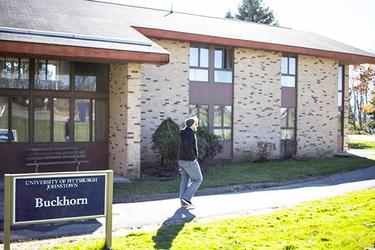 Senior Alex Taylor walks past Buckhorn Lodge, which is set to be renovated over the summer. Senior Alex Taylor walks past Buckhorn Lodge, which is set to be renovated over the summer. Tyler McNulty, Copy Editor November 16, 2016 According to Finance and Administration Vice President Amy Buxbaum, Buckhorn and Sunset lodges are in a design stage for renovation with a combined cost of $2.8 million. “These two lodges were identified specifically in the campus strategic plan as a priority. “The update is needed to bring these buildings to the standard of the other lodges. The other lodges have received significant renovation within the past 10 years,” Buxbaum said. The renovation over the summer is to include the addition of sprinklers, an updated electrical system and new furniture. New carpets, wall finishes and ceiling tiles are also set to be updated, being worked on by two Johnstown companies, according to Buxabaum. JPT Architects was selected for the design, and they are working with CJL Engineering on the project. “The project is not scheduled to be bid for construction until January with the goal of completing the construction during the summer of 2017.” Kappa Delta Rho President Zak Muto said he has lived in Sunset 2 for three years and thinks the renovations are long overdue. (See "Housing renovations to be finished sooner" March 2015, "Greeks plan to demand better lodges" Feb 2014) “There has been a lot of talk of a fully refurbished interior with new ceilings, walls and floors. “I would hope that is still the case and would love to come back and visit after graduating this year, and see that all the proposed changes actually happened,” Muto said. Muto also said the renovations hopefully will attract more fraternity pledges. “Coming down and seeing the atmosphere provided along with a refreshed interior will be a big step toward the growth of Kappa Delta Rho.” Muto said there is no real incentive to take care of Sunset 2 when so much is wrong with the place. “There are a lot of times we get asked how certain things got broken, and, usually, the issue dates back before anyone that currently is on campus was even enrolled at (Pitt-Johnstown).” “If this were to happen, we would have a place to call home that we are proud of and want to see kept in the best condition it can be. “I hope the end result turns the south lodges into a place people look forward to going back to after classes and enjoy during the weekends.” READ MORE: Sunset and Buckhorn lodges to be updated
Kaitlin R. Greenockle, News Editor September 30, 2015 Security cameras have been installed on campus. Student Affairs Vice President Shawn Brooks said a total of four cameras have been acquired. Of the four, three cameras have been mounted, but none of them are currently operational, according to Brooks. Two cameras were placed in the North Lodges area and one behind the Engineering and Science building, he said. “Upon learning about the camera installation, President Spectar made it very clear that this kind of issue needs to involve extensive student input,” Brooks said. Brooks is in the process of meeting with Student Government members to get their input and feedback about the security cameras. Under whose authority the cameras were placed is unclear. President Jem Spectar said he will order that the camera operation cease until there is an opportunity for students to provide input. One of the reasons for installing the security cameras is to have the capability of video review if an incident were to occur, according to Brooks. Student Government Campus Development Chair Matt Christina said Brooks had told him about the cameras, and they are working on a decision that will benefit all students. “As of right now, there is no formal decision on the cameras or how they will be used, if at all,” said Christina. Sigma Tau Gamma brother Gary Swope said he was not informed by university officials about security cameras facing the fraternity’s home. Swope said he is indifferent about the security cameras. “I’m not used to it being there, so I forget about it. But, when I remember it’s there, I feel like I’m being watched by a prison warden,” said Swope. He said he feels like he has to watch his every move now that the camera is there. Since Swope was not informed about the cameras, he said it concerns him where else they might be. “I’m pretty sure, by law, all students must be informed of the cameras before they are installed, which I was not,” Swope said. Student Government Student Policies Committee Chair Arielle Sloss said she is upset that university officials didn’t at least send out an email. “It shows that they don’t really respect the student,” Sloss said. Sloss said she doesn’t mind them, and she can see how they can be helpful when it comes to issues of ‘he said, she said.’ “Now they can go back to check a tape to see if someone was there or not,” Sloss said. She said, hopefully people will act better and the cameras may force students to behave when they are out. Student Government Association Parliamentarian Nick DiGiorgio said he was not informed of the cameras being installed either, he discovered them himself. “I do not have any negative feelings toward the new cameras. From my own observation, the cameras are placed in public places,” said DiGiorgio. He said he believes people should act in an appropriate way in public spaces and the cameras shouldn’t be added anxiety to anyone. DiGiorgio is curious as to how expensive the cameras were and whether that expense will influence tuition changes, said DiGorgio. “I think the cameras are a technological step toward a safer campus … If you aren’t doing anything wrong, why should you be concerned if someone is watching?” said DiGorgio. READ MORE: For some the trees have watching eyes
The apartments’ renovation plan is not finalized, but, as of now, renovations include new heating and air-conditioning units, balconies removal and new living room windows. Roof replacement, new carpet and kitchens also are part of the plan, according to Buxbaum.
Safety updates also are to be included in the renovations such as improving electrical issues, fire alarms and adding sprinklers, Buxbaum said. Hawthorn Lodge is to have updated bathrooms this summer along with finishing up the renovation at Highland Townhouses, Buxbaum said. “The townhouses’ renovations include new windows, drywall, carpet, paint, built in closets, ceiling tile, kitchen cabinets, counters, appliances and new bathrooms,” Buxbaum said. Buckhorn and Sunset Lodges are in future renovation plans, according to Buxbaum. Junior Joseph Walker said even if he had the option to live in the apartments, he wouldn’t because he likes living in the townhouses and not having to drive to campus for class. Walker said he doesn’t live in a renovated townhouse, but would like to in the future. “I would like a dishwasher and maybe a full bathroom downstairs,” Walker said. A sophomore, Hawthorne Lodge resident, Kyla Colcombe said she would like to see showers and the buildings’ foundations renovated. Due to the snow melting, Colcombe’s lodge flooded because of cracks in the foundation. “I would like it to be done faster, but I think three to four years is a realistic goal, when I heard it was to take up to seven years in the past,” Colcombe said. READ MORE: "Housing renovations to be finished sooner" Victoria Grattan, Staff Writer
January 20, 2015 Filed under News Pitt-Johnstown’s strategic plan lists objectives to enhance the quality of living and learning on campus. Among other objectives described in the seven-year plan, is a renovation schedule for campus facilities. Renovations listed as objectives include athletic facilities, classrooms and student housing. These renovations are to begin during the 2015 fiscal year. Mark Dougherty, Executive Housing Director, said that the residence hall renovations are to be completed by the end of the strategic plan, which expires in 2021. “Decisions about what those renovations will entail will be a joint decision among several university departments: Housing, Plant Operations, Student Affairs, and Finance and Administration,” Dougherty said. Walkthroughs of residence halls were to have been performed by Pitt-Johnstown President Jem Spectar to evaluate what may need to be changed. However, university officals may instead utilize a contractor to inspect the buildings. Andrew Walbeck, Facilities Management director, said that planning for capital projects is a continuous task. “It is something we are constantly evaluating and redefining,” Walbeck said. Nicholas Digiorgio, a Student Government Association senator on the association’s Campus Development Committee said that Spectar is pushing to get the proposed seven-year strategic plan completed in five years. “[Spectar] is taking an aggressive approach to remodeling resident facilities,” Digiorgio said. - See more at: The Advocate Eden Cohen, News Editor February 26, 2014 Filed under News Greeks are banding together to fight for a cause close to home. Kappa Delta Rho, Delta Chi and Alpha Sigma Alpha members are joining together to sponsor an event dubbed “Save the South.” The event is to raise awareness about the South Lodges conditions, participating member Brandon Dargay said. Buckhorn Lodge and Sunset Lodge are distinctly more worn than their northern counterparts, such as Larkspur Lodge and Briar Lodge, Dargay said. “The lodges have never been renovated,” Dargay said. “I believe my organization moved into (a southern lodge) as soon as it was built … 32 years ago.” Aside from the southern lodges being worn, they’re also not cheap. South Lodges residents, according to Dargay, pay the same amount as North Lodges residents for buildings in worse condition. Another concern, participating member Hannah Coughlin said, is administrators may choose to destroy the South Lodges altogether. “There has been a lot of talk about campus wanting to tear down the South Lodges and build a different building in its place,” she said. “We have a lot of history within our houses that would be devastating to lose.” Their ultimate goal, Coughlin said, is for the South Lodges to be renovated. In the meantime, Dargay said, the campaign’s purpose is to raise awareness. Participants are to sell shirts and advertise their cause, Dargay said. Proceeds are to go to the student government’s allocations fund for all student oranizations, Dargay said. “We believe that getting our message out and helping all organizations by donating to the fund is the best way to go about doing this,” he said. Participants plan to begin the event within the next month, and to continue until the end of the semester, Dargay said. “Possibly (we’ll) restart again next school year also, until the message has been sent,” he said. University president Jem Spectar said after academic building renovations are completed, the next project he plans to adopt is renovating housing, most notably the College Park Apartments and the South Lodges. “We just believe we’re being cheated,” Dargay said, “and we’re trying to show that we care enough to do something about it that is beneficial to everybody.” - See more at: http://www.upj-advocate.com/news/2014/02/26/greeks-plan-to-demand-better-lodges/#sthash.JUQnFCsD.dpuf February 26 2014: NEWS: Greeks plan to demand better lodges Tags: Alpha Sigma Alpha, Kappa Delta Rho, Housing
|
UPJ Greek News TodayFind the latest breaking news about UPJ. You can search by your organization name of by a date below. Categories
All
Archives
April 2024
|

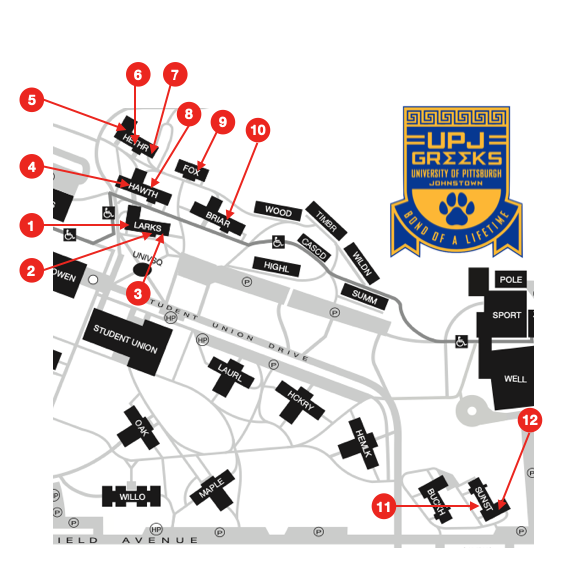
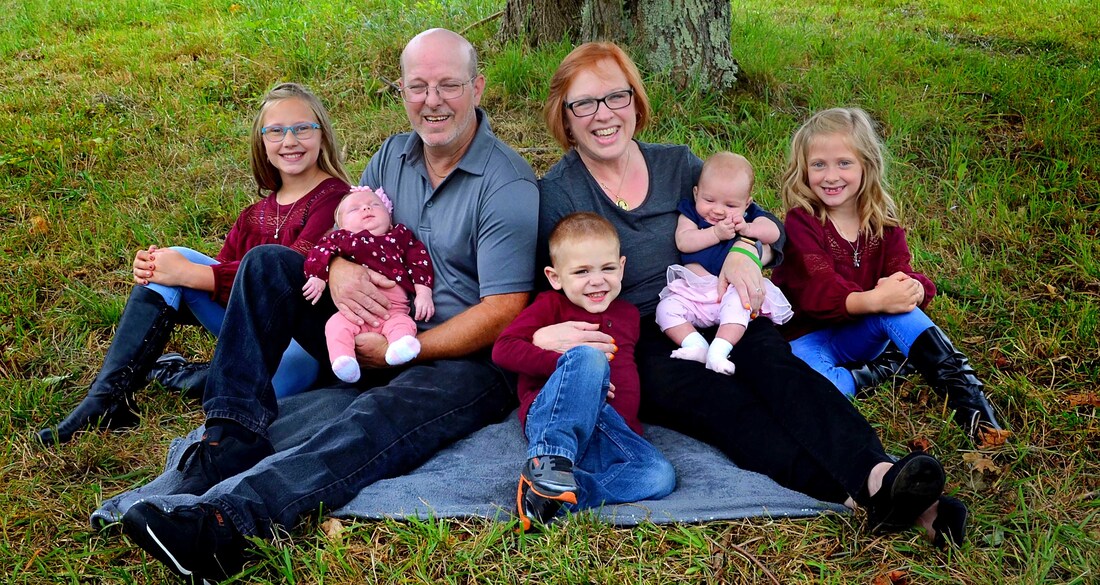
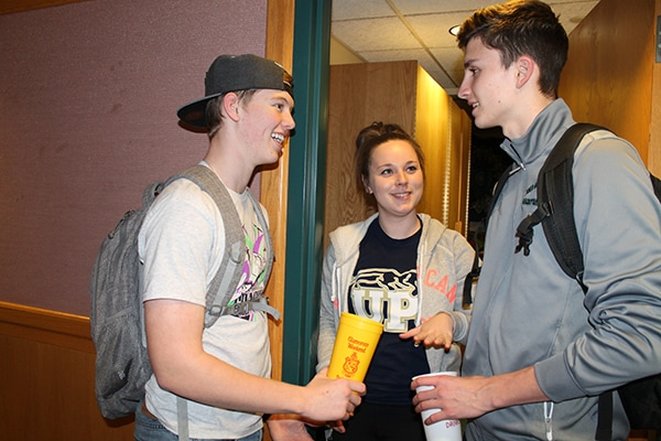
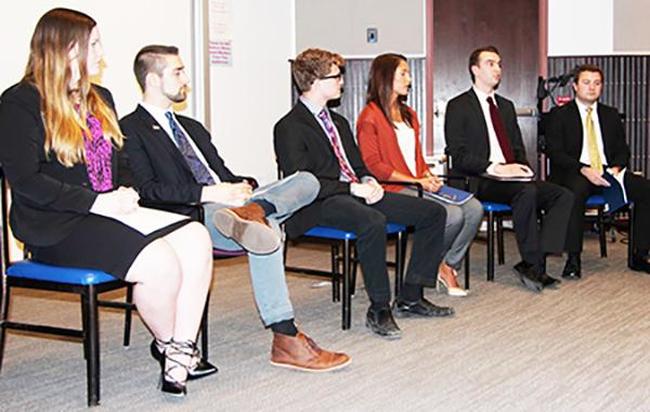
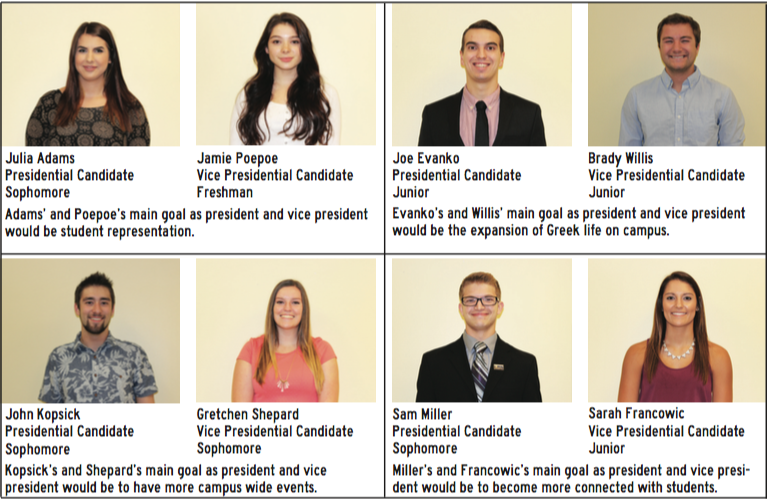
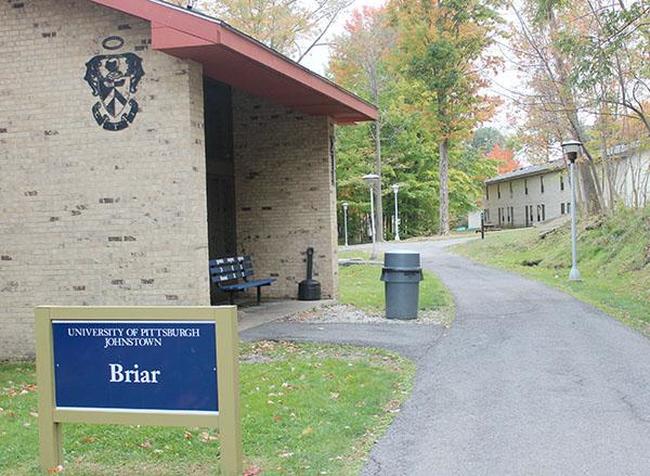
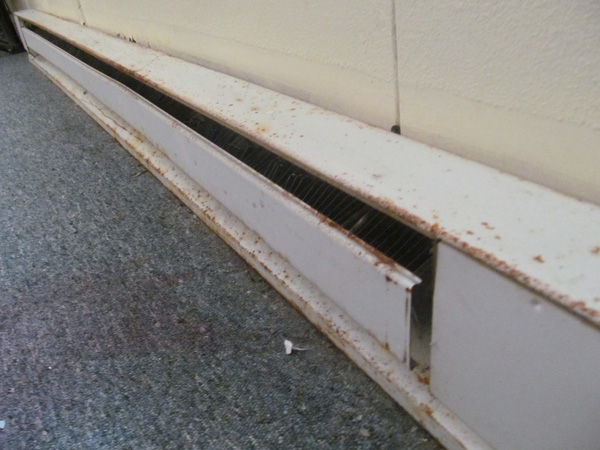
 RSS Feed
RSS Feed
